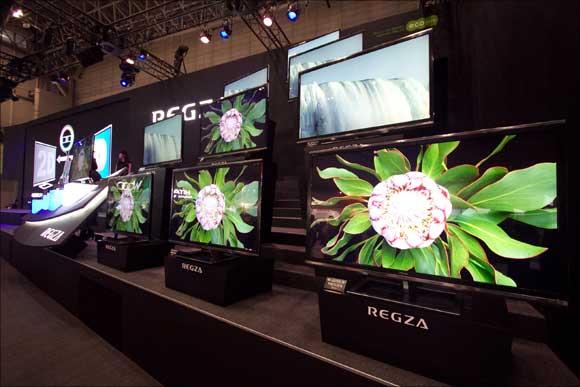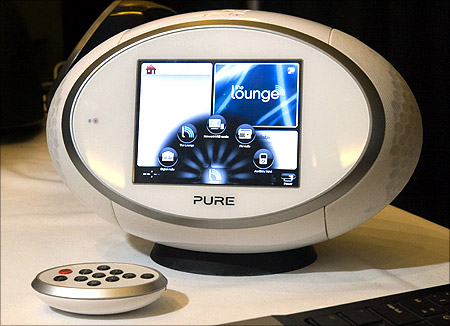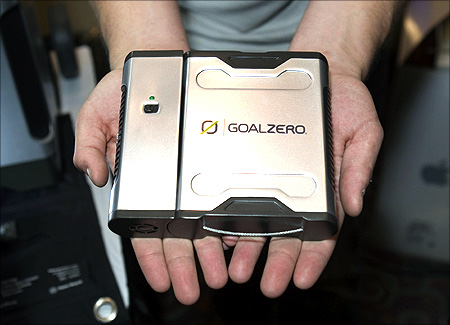Photographs: Chidi Nobi Business Standard
Although this has been suggested by the relevant government department for some time, as one of the first major initiatives that owes something to the new National Manufacturing Competitiveness Council that the Centre has established, it is worth examining the new scheme more closely.
The approval of 'modified SIPS' -- where SIPS stands for Special Incentive Package Scheme -- is expected to cost Rs 20,000 crore (Rs 200 billion) in the years to 2017, according to the Department of Electronics and Information Technology's plan.
That number includes, true, the earlier version of the scheme -- called just SIPS -- which remains in effect, as well as a proposal to help fund infrastructure for electronics manufacturing clusters, also cleared by the Cabinet recently.
. . .
Why 'industrial policy' help for electronics is good
Image: A portable audio system.Photographs: Rick Wilking/Reuters
Although this has been suggested by the relevant government department for some time, as one of the first major initiatives that owes something to the new National Manufacturing Competitiveness Council that the Centre has established, it is worth examining the new scheme more closely.
What the government is doing is betting on two things: first, that India will take to manufacturing electronics more easily than it has done for other products; and second, that the overall negatives associated with manufacturing in this country -- outdated labour laws, problematic supplies of power and water, and so on -- can be overcome through sectoral incentives, if you choose the right sector at least.
. . .
Why 'industrial policy' help for electronics is good
Image: Sensia 200D internet radio.Photographs: Steve Marcus/Reuters
These are big bets -- though the first, at least, seems justified.
If you're going down the dangerous path of 'picking winners' in an industrial policy, electronics is a safe sector to pick.
The revival of manufacturing has to start somewhere -- and this is one sector where it could.
Domestic supply of electronics is already less than half of domestic demand and although it is growing at 16 per cent already, demand is growing much faster.
Modified SIPS intends to partially fund capital expenditure and introduce incentives to move manufacturing to India from abroad.
. . .
Why 'industrial policy' help for electronics is good
Image: Sherpa 50 battery by Goal Zero.Photographs: Steve Marcus/Reuters
The cluster promotion scheme will provide subsidies for other forms of infrastructure investment related to electronics manufacturing.
The difference from the earlier SIPS is that it now has a much wider scope -- sensible, considering that the earlier scheme was largely ignored by semiconductor manufacturers after it was introduced, with almost every reasonable proposal coming from manufacturers of solar cells and panels.
That core manufacturing of semiconductors should receive more funding than other manufacturing units also makes sense, given cascading cost savings.
. . .
Why 'industrial policy' help for electronics is good
Image: Eers, custom-fitted earphones.Photographs: Steve Marcus/Reuters
However, the usual caveats will apply to this narrowly focused, sectoral, approval-based approach.
First, capital expenditure subsidies have typically been open to serious gold-plating by subsidy recipients, where the government is provided a fraudulent overestimate of the amount spent in order to squeeze out additional subsidy.
Putting a 'case-by-case' approvals process in place may be necessary to avoid fly-by-night operators, but it also opens up vast possibilities for rent-seeking.
. . .
Why 'industrial policy' help for electronics is good
Image: The super-sharp Regza 3D glasses-less television from Toshiba.Photographs: Chidi Nobi
And, hopefully, this is not a first step towards a more complete, traditional industrial policy -- which would include tariffs that hurt consumers and economic innovation and are very probably violations of India's WTO responsibility.
It remains to be seen if suppressed demand for inshore manufacturing of electronics is sufficient to overcome these negatives.
But it's worth trying.
Certainly, when there's minimal will or even apparent understanding in New Delhi of the necessity to reduce overall regulations that cripple the manufacturing sector, pushing sunrise sectors like electronics makes a little more sense.








article